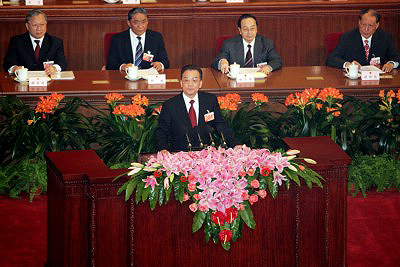
On the opening day of the annual session of China’s National People’s Congress (NPC) the government committed itself to raising the standard of living for the nation’s poor through greater spending on education and healthcare, and reforms to improve social security provision and employment opportunities.
The March 5 meeting began with government deputies praising Premier Wen Jiabao and the Central Government for their achievements over the past year. One deputy from northwestern Shaanxi Province, Li Pengde, said he was impressed by the practical measures it had taken to better standards of living.
The meeting continued with Central Government committing itself to increased investment and reforms aimed primarily at rural communities.
On education, the work report promised an investment of 223.5 billion yuan for compulsory rural education, an increase of 39.5 billion yuan on last year. Meanwhile, the government will increase expenditure on setting up national scholarships and stipends from 1.8 billion yuan in 2006 to 9.5 billion yuan in 2007, representing a fourfold increase.
In the field of health care, the central treasury will increase subsidies to the rural cooperative medicare system from 4.3 billion yuan to 10.1billion yuan.
And for China’s social securing system, the central treasury committed 201.9 billion yuan, an increase of 24.7 billion yuan and 14 percent on 2006.
All of these spending commitments are above China’s average annual economic growth rate in recent years, which is around 10 percent.
Commenting on the government’s spending plans Ou Keping, a deputy from southwestern Chongqing Municipality and professor from Chongqing University, said, “This is the first time a government work report at the NPC has spent so many words talking about education so systematically and comprehensively.”
Fu Yiming, a deputy from eastern Zhejiang Province and president of a local vocational college, had the same feeling. She said the most impressive new measure on education is to abolish all tuition for the nine-year compulsory education for students from rural families.
“We all know that equality on education is the biggest equality and this initiative will bring practical benefits to farmers,” she said.
President of Inner Mongolia University Xu Rigan, a member of the Chinese People's Political Consultative Conference, was most encouraged by the government’s decision to offer free education to students from all six normal universities, which are China’s top universities, directly under the Ministry of Education. This move will lead to an increase in the number of students enrolling from poor families, he said.
However, the Mayor of Chongqing Municipality suggested that Central Government could offer free education to students at normal colleges and universities at all levels. He said from the information he had about Chongqing, the majority of teachers at primary and junior middle schools were graduates of local normal schools or colleges rather than the six best known normal universities.
“I know that our government had carried out such a policy until the beginning of Cultural Revolution (1966-76) and I hope the government could reassume it,” he said.
| 